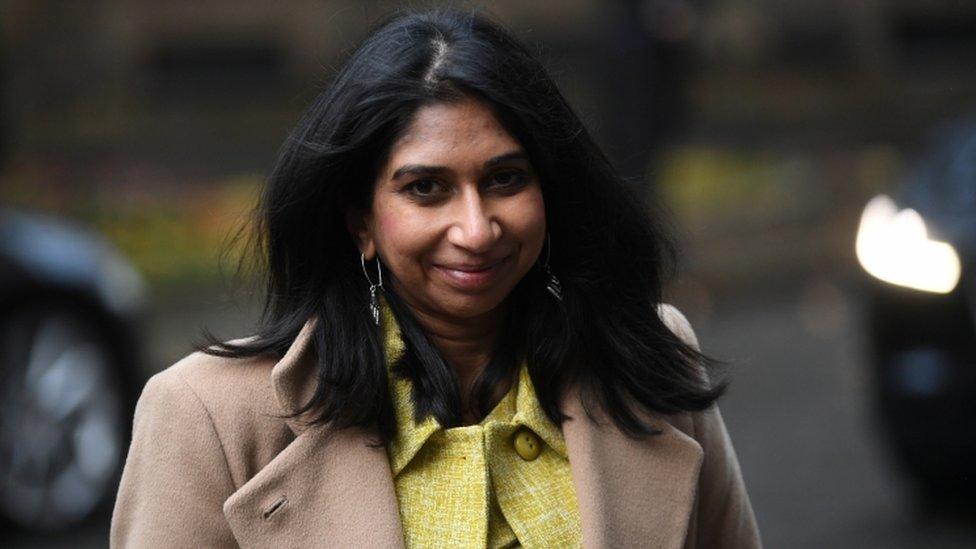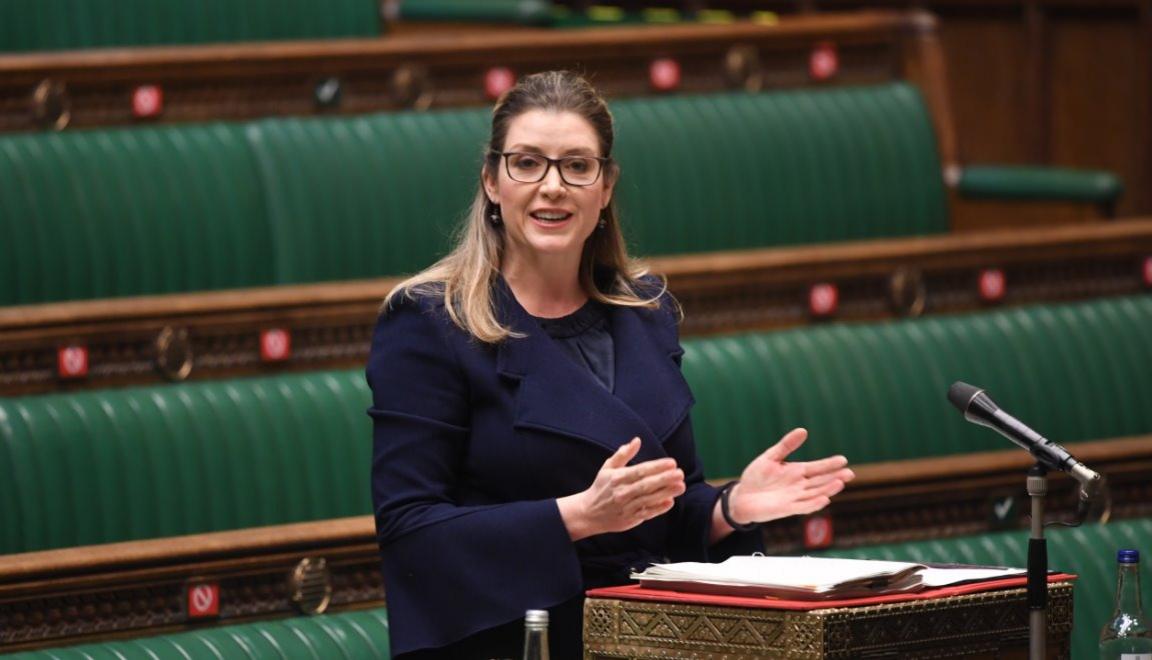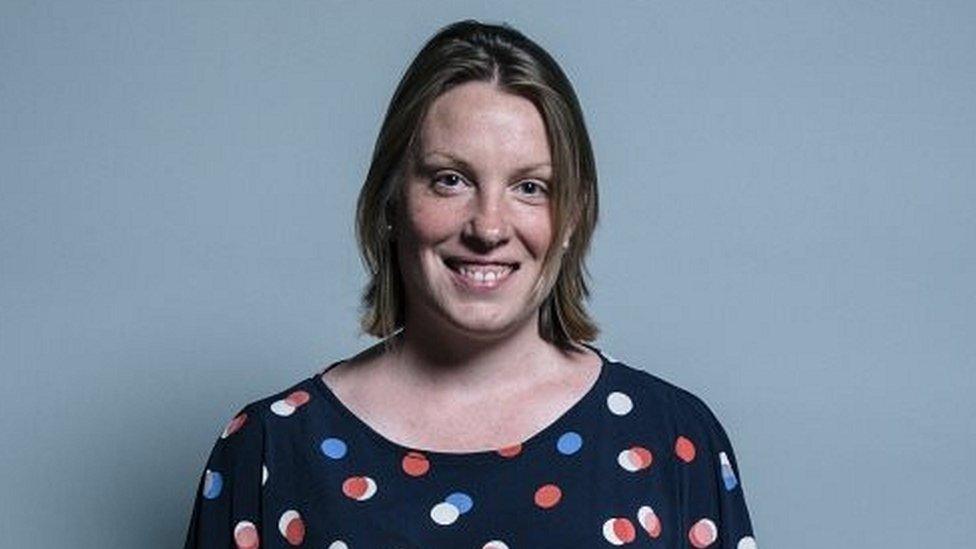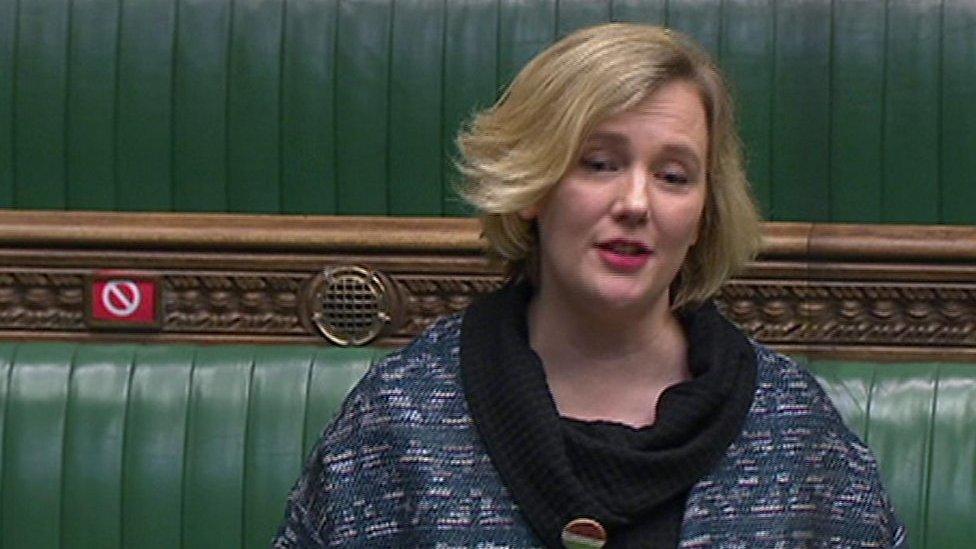Stella Creasy threatens legal action over paid maternity leave for ministers
- Published
Citing the suffragettes, Stella Creasy calls for all MPs to be given parental leave and not just those serving as ministers.
Labour's Stella Creasy is threatening legal action against the government after they did not include all MPs in maternity cover plans.
The government has passed a new law so senior ministers do not have to resign if they have a baby.
The move was prompted by Attorney General Suella Braverman, who is due to give birth next month.
Ms Creasy, who is also pregnant, welcomed the change, but said it should not just apply to those at the top.
Backbench MPs are allowed take informal maternity leave, but not all their duties are covered during their absence.
The situation is different for ministers, who are not able to take time off from their positions.
Under the old system, they had to resign from their ministerial jobs if they want maternity leave, although they continued to receive their MPs' salary.
But with the government's changes, Ms Braverman and other cabinet ministers are now able to take six months' leave on full ministerial pay, and the salary costs for a temporary replacement will be covered.
'Company car'
In 2019, Stella Creasy became the first MP to be given locum maternity leave cover, after a battle with the parliamentary authorities, who, she says, had told her it was not possible under Commons rules.
The government's decision to push the Ministerial and Other Maternity Allowances Bill, external through Parliament in a single day shows that it is possible, the Walthamstow MP said.
She told BBC Radio 4's Today programme: "I think every woman should be able to have paid maternity cover, proper cover - it's not just about being paid, it's that somebody else will be doing that job - so Suella Braverman will be able to take proper leave with her child."

Attorney General Suella Braverman is due to give birth next month
Ms Creasy, who is expecting her second child, said lawyers had advised her the changes were discriminatory as they only benefitted senior ministers, and not other members of Parliament.
"I am very prepared to go to court over this, because it is a form of direct discrimination... as a backbencher, none of these provisions will apply to myself, it's still very unclear what I can tell my constituents they can get in terms of cover," she told Today.
"Thousands of pregnant women are facing risks in the workplace, including the risk of the loss of their job. The message that we're sending is that we treat maternity leave like a benefit, like a company car."
'Wholly unacceptable'
Cabinet Office Minister Penny Mordaunt told MPs the bill to change maternity rights for senior ministers was an "important and well overdue change".
She said alterations in the Ministerial Code in 2019 allowed for other members of the government to take over roles from a junior minister on maternity leave.
The bill puts to an end the "wholly unacceptable" situation of senior ministers resigning to allow other government members to take over their departments while on maternity leave, she said in the Commons.

Minister Penny Mordaunt said the law would make for an "important and well overdue change".
Ms Braverman said she was grateful to Boris Johnson and the Conservatives for "leading this historic change to support women in the workplace".
Labour did not oppose the changes in the Commons.
Former Work and Pensions Secretary Yvette Cooper told MPs it had been 20 years since she was the first junior minister - then in the Department of Health - to take maternity leave.
She warned the changes were "limited" as they did not have any provisions for male ministers to take longer paternity leave.
Ms Cooper said that when she needed to take maternity leave two decades ago: "I asked the health secretary what I should do, he didn't know, he said ask the prime minister, he didn't know, he said ask the cabinet secretary he said he had no idea.
"As ministers are Crown appointments, he said it was really a matter for the Queen, but nobody thought we should be asking Her Majesty."
The MP said they "then tried to work something out" that was similar to the arrangements for civil servants, but "no one had thought about it before - that was bad enough 20 years ago".
She added: "At the heart of government [these issues] still aren't being taken seriously enough."

Maternity and paternity rights for MPs

Tracey Crouch took maternity leave in 2016
All MPs are paid in full while on maternity, paternity or adoption leave. But not all their duties in Parliament are covered during their absence:
Conservative MP Tracey Crouch, external was the first Conservative minister to take maternity leave in 2016. She said she had been unsure about accepting the job of sports minister because she wanted to start family
Chloe Smith interrupted her maternity leave in 2017 to take part in a vote - becoming the first Conservative MP to bring their baby in to the Commons chamber
In 2019, Labour MP Tulip Siddiq went against the advice of her doctors and delayed a planned caesarean section so she could take part in a crucial Brexit vote
Labour's Stella Creasy was given permission to appoint a "locum MP" to cover her maternity leave in 2019
Father-of-three Conservative MP Bim Afolami, external was the first dad able to vote by proxy when he took paternity leave

Liberal Democrat MP Wendy Chamberlain said for female MPs, there were now provisions for locums to step in, but pointed out that was not yet available for male MPs on paternity leave.
Some MPs had complaints about the language in the bill - which used the word "persons" instead of "women" - saying it was "adopting extreme gender ideology".
But Ms Mordaunt said it had merely been a "drafting issue" and the term "women" would be used in all its documents going forward.

Parental rights in the UK
Women are entitled to up to 52 weeks' maternity leave
They must take at least two weeks' leave after the baby is born (or four weeks if they work in a factory)
They are eligible to be paid for six weeks at 90% of their average weekly earnings and 33 weeks at £151 per week or 90% of their average weekly earnings (if lower)
Fathers can take two weeks' statutory paternity leave at up to £151 a week
Some couples are also entitled to shared parental leave of up to 50 weeks and 37 weeks of pay
Some employers give contractual maternity pay as a benefit, what is paid varies, but is more than Statutory Maternity Pay
Others are eligible for Maternity Allowance, paid by the government, this is usually for people who've been employed or self-employed for 26 weeks in the 66 weeks before their due date
- Published11 February 2021
